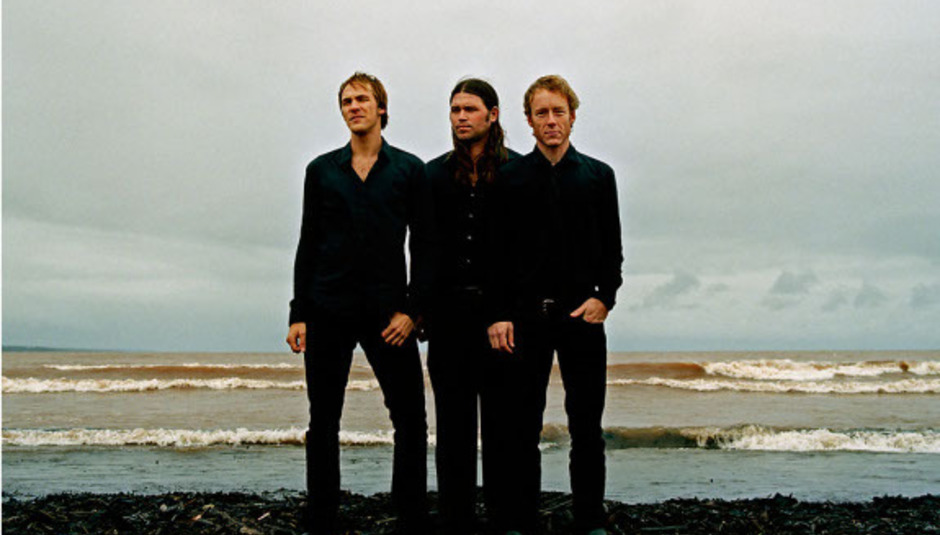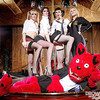With the release of the second Retribution Gospel Choir album this week, Alan Sparhawk’s “side-project” from Low looks set to become an equal partner. As ever, the deceptively simple music manages to be as powerful as Neil Young & Crazy Horse or Iggy & The Stooges without being a re-tread of either. DiS caught up with the man himself...
DiS: In Low’s first UK interview, you described the moment when you thought about playing the slowest darkest music possible… and then thought “Cool”. Was their a similar RGC moment?
AS: Not really. I’d seen those guys [Eric Pollard, drums; Steve Garrington, bass] play. There was this one local festival we played, and the show went really well. We rehearsed, and I had a hunch it would work…. The bass player plays a lot of jazz, and he can play stand-up bass; Eric I knew from the gym.
DiS: Watching RGC play live as a three-piece, you find yourself looking around for the extra players, because it’s not only heavy, the bass is doing so much melodically.
AS: Yeah, yeah. The challenge is to do as much as you can, and build this… monolith. They’re great musicians, who’ve been trained, so there are these possibilities you don’t have with Low.
DiS: Musically, how different are RGC & Low? A lot of the songs have the same long, sustained chords, with the guitar turned up much higher, but are there other things you’re trying, and other musical differences?
AS: I’m definitely speaking from the same voice. Playing with different people means they’re more receptive to some other ideas though. I’m pretty much a chameleon when it comes to the people I’m playing with. There’s something I get with them I don’t with Low, as far as technicality goes. Something I can stretch out on, but it feels like the same fight, you know? It’s not like there’s a conflict going on. We can tear it up. It’s about the songs, and what we can do with them. I don’t really think about it too much.
DiS: Picking up on what you said about being ‘chameleonic’ it stuck me that because you’re playing much heavier songs, in the lyrics [esp. ‘Destroyer’ on RGC # 1], Biblical figures get cast a lot more like Classical heroes, or those muscular William Blake illustrations. There’s a sense that you’re recasting the role of a prophet for more violent times. Has your faith changed, or are the songs simply a reflection of the music?
AS: Well, there’s something about Retribution Gospel Choir that we’re reaching out and grabbing people by the throat. But, [religion] is a big part of my life, so creativity and spirituality aren’t that different. They’re asking the same questions: What is our purpose? Is there any point in even communicating with anyone else? Everyone struggles with that… It’s not intentional, though – it’s not like I sit down and think I’m going to write a song about Jesus. It’s part of who I am, and I like to play with that… to make sense of how I’m thinking.
DiS: Does the name “Retribution Gospel Choir” relate to Mormon doctrine, inasmuch as “blood atonement” is one of its distinctive aspects?
AS: Well, “Retribution” is more like “re-tributing” [than revenge]; giving back for what you’ve taken, rather than payback. It’s not necessarily an agenda. I just picture a Southern Baptist Preacher introducing the “Retribution Gospel Choir” [slips into preacher’s voice].
DiS: There’s a big overlap between Drums and Guns and the first RGC album, in terms of the songs, but the sound of the two albums couldn’t be more different.
AS: Well, there’s definitely an intention to do something new. We didn’t want to just use drums, bass, and guitar, and play the songs. We wanted to take it away from the things we were used to. For the last several years it’s been about taking some chances.
DiS: Is there likely to be an overlap between RGC’s second record, and the next Low record, as there was last time?
AS: I don’t think so. We’ve done a lot of shows, and now we’ve got our own voice a lot more. I mean, yeah, it’s still me, but with Low we’re all over the place, so I don’t know. […] With Drums and Guns there was a little voice in my head that said “why don’t you make a really difficult record?” but at this point, most of our fans are quite receptive. I feel pretty empowered at this point. We can be that free, and challenge ourselves, knowing there are people who will continue to engage with it.
DiS: It’s reassuring that’s how you feel about most of the fans, because the last time I saw Low, at the Christmas 2008 gig at Koko, there was a heckler yelling about how you’re not the same band you used to be, and he’d been coming to Low gigs for 11 years… although you had a great come-back, that time, saying that you’d been coming to Low gigs for 15 years.
AS: Oh, him. I’ve been getting stuff like that for years. When that happens I’m like, “Come on… and I will bury you!” We’ve been on the stage for a long time, so… you know, “Who the Hell are you to challenge me?!” There are a couple of times I’ve come close to punching someone… one of them was at the Union Chapel, and [laughs] I think it was tongue-in-cheek for the most part, but I started saying “Hey! Come up here! Come up here, I’m going to punch you right in the face. C’mere! I’m gonna kill you!” It was probably humorous, but… one time we opened for Radiohead in Madison Square Gardens, and some guy was heckling from the front row, and I went “Really, really…? You came all the way here, to the front row, to heckle me?! You’re a pig. You’re all pigs!” But… it’s a unique relationship, and I think there’s huge possibilities for playing with that. It can be dangerous… and funny.
DiS: I was at the RGC gig at London’s Water-rats, in 2008, when you introduced RGC as “a new band” and then asked for any requests – actually, it was one of my friends who wanted you to take off your shirt – what other ones have you had?
AS: Oh yeah… we didn’t though did we? [laughs]
DiS: I’ll let her know to keep trying.
AS: Yeah, yeah…
DiS: Do you still feel like a new band?
AS: We’re still starting out. We’ve had some surprising requests for places to play that maybe Low hadn’t been. So, we’re going to Italy… to Sweden. It’s interesting to see who responds to a new band. Probably just the UK… America’s still got its boots stuck. It’s just slower here. It takes longer… the mechanisms for people finding about new stuff. You can tour your brains out, and no-one notices.
DiS: Having seen the recent documentary I was surprised at how small and isolated Duluth is. How did you find out about the music you were listening to, growing up?
AS: Well, this was pre-MTV, so it was a lot harder, and the whole underground, counter-culture thing was just starting up […] Now I just listen to reggae! Drums and Guns really came out of listening to dub. It means a lot to me spiritually. The humility and the righteousness. The spirituality is what keeps me coming back. Recently I’ve been listening to Bunny Wailer. He did one good solo record that’s so beautiful and selfless and righteous. Almost holy. It makes you feel alive. […] There’s not much to do round here but listen to a lot of reggae… smoke a lot of reefer.
DiS: So, is that still a part of your life, after the events of the last few years?
AS: Well, you know, a lot of people out there smoke pot today… I’m not trying to hide anything from anybody, and it’s not something I’m trying to make a big issue about.
DiS: You made a very candid contribution to the documentary, though [You May Need a Murderer]. Was it helpful to have done that?
AS: It wasn’t about setting anything straight. After a while [as someone in the public eye] you don’t really have much control. I think at the time when we did that, I didn’t really picture me being the one doing so much talking. I thought it would be us, driving from town to town, playing, and stuff. It ended up as me talking…
DiS: …and quite seriously, about how drastic the situation is in the world today, using the language of the “end-times”.
AS: Yeah, but I am hopeful. We’re all part of an eternal family, but… to say that you sense a fall, a collapse in society, and to base it in scripture… still, however dire that is, in an eternal perspective, the idea of the world being this machine falling apart, it’s… all just a drop in the bucket. You can feel like This Is It, and the end of the world’s scary, and it’s all dire, but… I probably put it better in the documentary. I watch this whole period we’re going through, and I’m sitting at the side, and I still see this loving and accessible personal God. I can’t explain it.
DiS: I suppose it’s the very possibility of catastrophes that prompts people to unite in the face of it… however few people that is, and that’s what’s heartening.
AS: Yeah, my favourite thing in literature is [Kierkegaard’s] “Night of Infinite Resignation”. The idea that it’s all worthless, and there’s nothing, and yet people still go on.
DiS: What are you reading at the moment?
AS: It’s actually a book about running… but from the perspective of evolution and history. In Mexico, there are these Indians who are amazing distance runners…but anyway, this guy’s trying to get back to the primal reasons for why we run.
DiS: In the right context, the high that runners get could be considered a kind of spiritual ecstasy, I guess.
AS: Right. Running’s been really important to me for mental health. Then again, I also just read stuff like this biography of a baseball player who obviously just switched on the tape, and talked about how he’ll be fishing and drinking beer in the morning, then go out and play…
DiS: Going back to the music, is there a sense that RGC may evolve more in future – having made two albums not much over 30 minutes – just as Low did, after the first 5 or 6 albums?
AS: Well, I make the same sort of assumptions when I’m writing, but with a different band. You know: “two verses, two choruses, and a bridge… that’s an 8 minute song, right?” [laughs] But, RGC just works out a lot quicker. Most of the songs I know how they’re going to sound, but you’ve got something like ‘Electric Guitar’ [which is actually 8 minutes long] and that just developed from jamming. There’s a lot of possibilities, but… one step at a time.
DiS: What’s your favourite song on the new record?
AS: I always liked ‘Poor Man’s Daughter.’ It’s fun to play live, and I like ‘Your Bird’ because you can put lots of good solos in.
DiS: What might you be doing live, this time, that you don’t do on record?
AS: We still do the long dub section. The long songs get longer. We sweat and bleed a lot more than with Low! We’re getting there… it’s a dying art.
DiS: The last time I saw RGC play live, we noticed how much you were going for a sort of early David Bowie look [curly, shoulder-length hair; very gaunt], and then at the end you actually played ‘Ziggy Stardust’.
AS: That was fun… actually it was because of my 5-year old son, because as soon as he could figure out the CD player in the kitchen, he’d put on Bowie, like 20 times a day.
DiS: Your kids are hidden in the background on Things we Lost in the Fire and Trust, but have they appeared on anything since?
AS: Oh, they’re on The Great Destroyer, but Drums and Guns we had to go away for. Hollis sings a lot, but Cyrus will pick up anything in the practice space, and start improvising. The other day he was in this store, and he walked up to this big tuba, and started wailing on it! Most people can’t even get a note from that thing. You know, kids are fun… you can talk about them all day, La-la-lala-la… […and goes on to talk about whether Cyrus should have been called Maha Shalal Hash Baz… which is a Hebrew phrase meaning “God’s coming, and He’s going to destroy us all”]
DiS: Thinking of The Great Destroyer, that name sounds like a way of referring to the physical body – if not the material world – in Gnosticism, but I got the impression it had some significance in Mormonism, too…?
AS: Yes, Yes – it’s supposed to make you ask, What is it about me, or us, that makes us destroy things? Or, corrupts perfection. I guess Drums and Guns was taking that further, and talking about why we kill each other. I suppose the answer is, we are all killers […to eat, to maintain our way of life.]
DiS: So, is the cover of the new record, with its ice-fields, a comment on environmental destruction? The glaciers melting…
AS: Not really. It’s actually near where we live. It just looked amazing, with the light coming through it. Although, with the blue light behind it, it does look like something might be coming.
DiS: So, at what point will you be starting on the new Low record?
AS: We need to work out more what we’re doing with the songs. […] There’ll always be Low, but I want to take some time to see what happens with this band. […] Not that it’s about money, and whether people find it more appealing than Low; I just like this [new] band, and it’s as much a matter of life and death as anything I’ve ever done.
DiS: I like the fact that the contrast between the bands means they say something about each other.
AS: Yeah, I’ll have to remember to say that, when people ask…
DiS: Given that you’ve had a solo record, and two records with a new band, has Mimi ever thought about doing one, or a Low record that’s predominantly her on lead-vocals?
AS: It’s certainly something we’ve thought about for the last few years, but we’re unsure how to present it. We have considered it though.
DiS: What looks likely to make it on the new Low record?
AS: There’s a song called ‘20 Dollars’ we’ve played for a few years, but there are always one or two songs that define each album, and that song’s a beacon for me now. […] Like, with RGC, ‘Breaker’, and on The Great Destroyer we had ‘Walk into the Sea’ and ‘Death of a Salesman’. With the new Retribution record, it was ‘Your Bird’ because it’s such an “up” pop song; it felt so effortless, and melodic.
...and the version with Mark Kozelek of Red House Painters / Sun Kil Moon:
DiS: One of the lyrical motifs that crops up in ‘Breaker’ but seems very Low, is this idea of “math” [as in, “our bodies break / and my blood just spills and spills / and here we sit debating math”]. It’s there in ‘John Prine’ and ‘Death of a Salesman’, right back to Long Division as a figure for something inhuman and abstract, or the world of work and business maybe. Is there something else it means to you, though?
AS: I don’t know. It’s a struggle. I know there’s something hopeful, and it’s like I’m screaming at myself and saying, “we’ve made a few records, and… there are good things… so, just snap out of it, you know? That was a really shitty time, but… I’m still alive! Have a good time!” […] Personally, the last few years have been a huge milestone for my mental health, but I’ve always been very hopeful.
DiS: It interested me, when you wrote your open letter [explaining the need to cancel some tourdates, a few years ago] that you described having been diagnosed with all kinds of conditions… but also having nothing wrong with you at all and just being “lazy”. Is that a problem when it comes to treating artists of any kind – that, by definition, they have different coping mechanisms, and reasons to value their moods?
AS: Sure, there are some coping mechanisms… but when you have to go through the mental health system, mostly all they can do is sign you up for drugs. I don’t know if that’s an answer. The mental health thing is weird. [sighs] I guess I can say now, most people are not quite like me, in the way they handle stress. One thing you learn when you go through that system, and go through that experience is, there are so many other people in the same boat… and worse. […] I’m still in the forest. I can’t see the trees...
Live Shows:
March 10 - Sheffield, The Grapes
March 11 - Manchester, Ruby Lounge
March 12 - Glasgow, Captain's Rest
March 13 - Dublin, Whelans
March 15 - London, Cargo






















